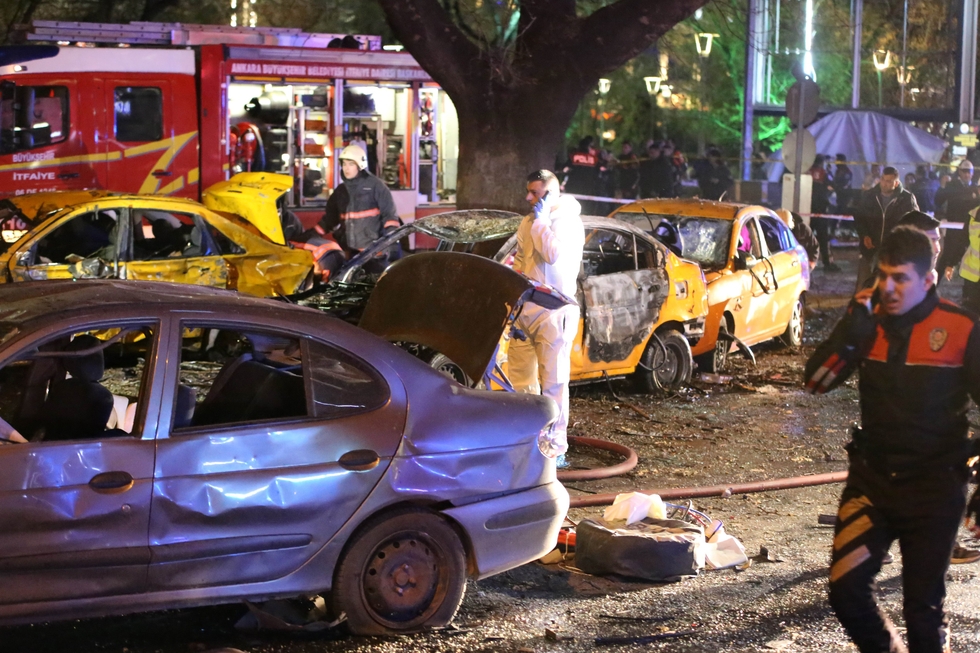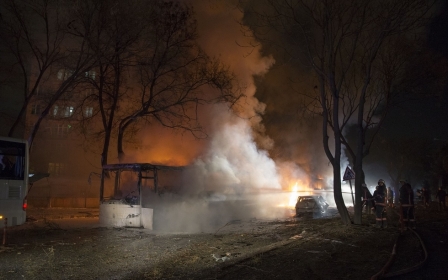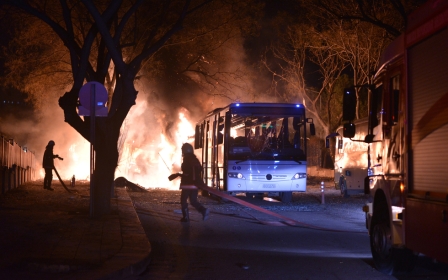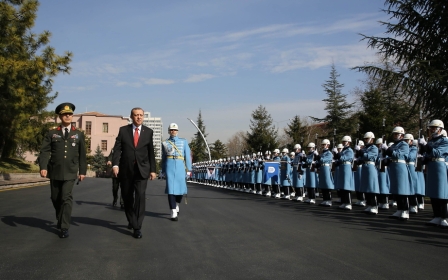Dozens killed, 125 wounded in Ankara car bombing

A bomb ripped through a busy square in central Ankara Sunday, killing at least 34 people and wounding 125, according to Health Minister Mehmet Muezzinoglu, who spoke at a news conference, Hurriyet reported. A bomb-laden car caused the blast, Interior Minister Efkan Ala said at the same conference after a security meeting in Ankara.
The blast in Kizilay square is the second major attack in the heart of the Turkish capital in less than a month, after a suicide car bombing on 17 February targeting the military that killed 29 people, claimed by a dissident faction of the outlawed Kurdistan Workers' Party (PKK).
The fact that militants were able to strike again so soon in an area close to the prime minister's office, parliament buildings and foreign embassies will raise fresh questions about Turkey's ability to manage the twin security threat posed by the Islamic State group (IS) and Kurdish rebels.
No group has yet claimed the attack. However, a security official told Reuters news agency that initial findings suggested it was the work of the outlawed Kurdistan Workers' Party (PKK) or an affiliated group.
Ambulances ferried the wounded from the square, a bustling commercial area and local transport hub, to 10 different city hospitals.
The bomber struck at around 6:45pm local time and the force of the explosion - which the CNN-Turk news channel said killed 23 people instantly - reduced several vehicles to charred husks and damaged nearby shops.
A security official said initial findings showed the blast was a suicide attack.
Prime Minister Ahmet Davutoglu chaired an emergency meeting of security chiefs in the wake of the blast, Dogan news agency reported.
President Recep Tayyip Erdogan, who was in Istanbul, was briefed by Interior Minister Ala about the blast on the phone, according to presidency sources, Hurriyet reported. Erdogan condemned the attack in a written statement, adding that "Turkey has become a target of terror attacks due to the instabilities in the region." Turkey will continue its determined fight against terrorism, he said.
Security warning
Turkey has been on high alert following a string of deadly attacks since the middle of last year, most of them blamed on the IS group, including a double suicide bombing in Ankara in October that left 103 people dead.
As recently as Friday, the US embassy issued a warning about a possible plot to attack part of central Ankara, advising American citizens they should avoid the area.
Sunday's blast comes at a delicate moment for Turkey, as it seeks to persuade the EU to speed up its path to membership of the bloc in return for help with the migrant crisis.
The Kurdistan Freedom Falcons (TAK), linked to the PKK, said it carried out the February bombing in Ankara as revenge for operations by the Turkish military in the southeast of the country and warned foreign tourists not to visit.
A two-year ceasefire between the government and Kurdish rebels collapsed in the middle of last year and since December security forces have been waging a major campaign against the PKK in the southeast of the country.
Strict 24-hour curfews were imposed in a number of Kurdish-dominated towns and cities to allow the military and police to pursue the battle against fighters who had dug trenches and put up barricades.
Major attacks since 1982
Following is a list of the worst bomb attacks in Turkey since 1982:
13 March, 2016: At least 34 people are killed and dozens wounded in a car bombing near Ankara's main Kizilay square.
17 February, 2016: 29 are killed in a car bombing targeting the Turkish military in Ankara. The attack is claimed by a group calling itself the Kurdistan Freedom Falcons (TAK) but Turkish authorities say there was also a Syrian Kurdish link.
12 January, 2016: Eleven German tourists are killed and another 16 people wounded in a suicide attack by a Syrian bomber in Istanbul's Sultanahmet district, the ancient tourist heart of the city.
10 October, 2015: 103 people are killed and more than 500 wounded in twin suicide bombings targeting a pro-Kurdish peace rally in Ankara.
20 July, 2015: 34 people are killed and about 100 injured in a suicide bombing in the predominantly-Kurdish town of Suruc near the border with Syria. Turkish officials blame IS.
11 May, 2013: A twin car bomb attack kills 52 people in Reyhanli near the Syrian border. Ankara blames pro-Damascus groups.
11 February, 2013: 17 people are killed when a Syrian minibus explodes in Reyhanli.
27 July, 2008: Two bombings in Istanbul leave 17 dead and 115 wounded. The authorities blame the Kurdistan Workers' Party (PKK).
12 September, 2006: Ten people, including children, are killed in a bomb blast in Diyarbakir, the largest city in the mainly Kurdish southeast. The PKK denies involvement.
15 November and 20 November, 2003: Four suicide car bomb attacks in Istanbul hit two synagogues, the British consulate and a branch of the British multinational bank HSBC, leaving 63 dead, including Britain's consul general, and hundreds wounded. The attacks are claimed by Al-Qaeda and a Turkish extremist group named the Islamic Front of Raiders of the Great Orient.
13 March, 1999: Twelve are killed in a firebombing on an Istanbul shopping mall. The attack is claimed by the PKK, which later retracts its statement.
25 December, 1991: Explosives and firebombs are hurled at an Istanbul department store, killing 17 people and injuring 23. The attack is blamed on the PKK.
6 September, 1986: A twin suicide bombing claimed by Islamic Jihad kills 22 people at a synagogue in Istanbul.
7 August, 1982: A bomb at Ankara airport followed by a gun battle leaves 11 dead and 63 injured. The attack is claimed by the Armenian Secret Army for the Liberation of Armenia (ASALA).
New MEE newsletter: Jerusalem Dispatch
Sign up to get the latest insights and analysis on Israel-Palestine, alongside Turkey Unpacked and other MEE newsletters
Middle East Eye delivers independent and unrivalled coverage and analysis of the Middle East, North Africa and beyond. To learn more about republishing this content and the associated fees, please fill out this form. More about MEE can be found here.




